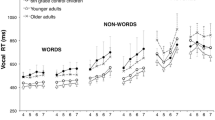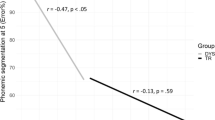Abstract
The present investigation examined thehypothesis that early auditory temporalprocessing deficits cause later specificreading disability by impairing phonologicalprocessing (Farmer & Klein 1995; Tallal1980, 1984). Temporal processing ability atschool entry was examined using Tallal'sRepetition Test in a large unselected sample ofover 500 children followed over subsequentyears. Although our data confirmed the presenceof certain non-speech auditory processingdeficits in children later classified asspecific reading-disabled, many findings wereclearly at odds with a causal interpretation ofthis relationship. (1) Reading-disabled (RD)children were impaired at school entry on thesubtest with long interstimulus intervals(ISIs) but not the critical short-ISIsubtest. (2) RD children were not inferior toreading-age (RA) controls. (3) A subgroup of RDchildren with evidence of temporal deficitswere no less proficient on later phonologicalor reading measures than RD children with noevidence of early temporal impairment. (4)Although there was a reliable concurrentcorrelation between temporal deficits andphonological awareness at school entry(suggesting a possible common causeexplanation), early temporal deficits did notpredict later phonological impairment,pseudoword processing difficulties, or specificreading disability. On the other hand, earlytemporal deficits did predict later oralreceptive vocabulary and reading comprehensionweaknesses. These findings suggest thatauditory temporal deficits in dyslexics may beassociated with the same dysphasic-typesymptoms observed by Tallal and her colleaguesin specific language-impaired populations, butdo not cause the core phonological deficitsthat characterize dyslexic groups.
Similar content being viewed by others
References
Aaron, P.G. (1997). The impending demise of the discrepancy formula, Review of Educational Research 67: 461-452.
Blachman, B. (1997). Foundations of reading acquisition. Mahwah, NJ: Erlbaum.
Bowers, P. & Wolf, M. (1993). Theoretical links among naming speed, precise timing mechanisms and orthographic coding skill in dyslexia, Reading and Writing: An Interdisciplinary Journal 5: 69-85.
Burgemeister, B.B., Blum, L.H. & Lorge, I. (1972). Columbia mental maturity scale. New York: Harcourt Brace Jovanovich.
Byrne, B. (1998). The foundations of literacy. East Sussex, UK: Psychology Press.
Cornelissen, P., Bradley, L., Fowler, M.S. & Stein, J.F. (1992). Covering one eye affects how some children read, Developmental Medicine and Child Neurology 34: 296-304.
Farmer, M.E. & Klein, R.M. (1995). The evidence for a temporal processing deficit linked to dyslexia: A review, Psychonomic Bulletin and Review 2: 460-493.
Fletcher, J. M., Shaywitz, S.E., Shankweiler, D., Katz, L., Liberman, I., Stuebing, K., Francis, D.J., Fowler, A. & Shaywitz, B.A. (1994). Cognitive profiles of reading disability: Comparisons of discrepancy and low achievement definitions, Journal of Educational Psychology 86: 6-23.
Goswami U. & Bryant, P. (1990). Phonological skills and learning to read. East Sussex, UK: Erlbaum.
Haggerty, R. & Stamm, J.S. (1978). Dichotic auditory fusion levels in children with learning disabilities, Neuropsychologia 16: 349-360.
Jackson, N.E. & Butterfield, E.C. (1989). Reading-level match designs: Myths and realities, Journal of Reading Behavior 21: 387-412.
Jorm, A.F., Share, D.L., Maclean, R. & Matthews, R. (1986a). Cognitive factors at school entry predictive of specific reading retardation and general reading backwardness: A research note, Journal of Child Psychology and Psychiatry 27: 45-54.
Jorm, A.F., Share, D.L., Matthews, R. & Maclean, R. (1986b). Behaviour problems in specific reading retarded and general reading backward children: A longitudinal study, Journal of Child Psychology and Psychiatry 27: 33-43.
Katz, R.B., Healy, A.F. & Shankweiler, D. (1984). On accounting for deficiencies in order memory associated with reading difficulty: A reply to Tallal, Applied Psycholinguistics 5: 170-174.
Klein, R.M. & Farmer, M.E. (1995). Dyslexia and a temporal processing deficit: A reply to the commentaries, Psychonomic Bulletin and Review 2: 515-526.
Livingstone, M.S., Rosen, G.D., Drislane, F.W. & Galaburda, A.M. (1991). Physiological and anatomical evidence for a magnocellular defect in developmental dyslexia, Proceedings of the National Academy of Sciences 88: 7943-7947.
Lovegrove, W. (1994). Visual deficit in dyslexia: Evidence and implications. In: A. Fawcett & R. Nicolson (eds.), Dyslexia in children. Hemel Hempstead Herts: Harvester Wheatsheaf.
Mody, M., Studdert-Kennedy, M. & Brady, S. (1997). Speech perception deficits in poor readers: Auditory processing or phonological coding?, Journal of Experimental Child Psychology 64: 199-231.
Rack, J.P., Snowling, M.J. & Olson, R.K. (1992). The nonword reading deficit in developmental dyslexia: A review, Reading Research Quarterly 27: 29-53.
Rutter, M. (1967). A children's behaviour questionnaire for completion by teachers: Preliminary findings, Journal of Child Psychology and Psychiatry 8: 1-11.
Shankweiler, D. & Liberman, I.Y. (1989). Phonology and reading disability: Solving the reading puzzle. Ann Arbor, MI: University of Michigan Press.
Share, D.L. (1995). Phonological recoding and self-teaching: Sine qua non of reading acquisition, Cognition 55: 151-218.
Share, D.L. (1996). Word recognition and spelling processes in specific reading disabled and garden-variety poor readers, Dyslexia 2: 167-174.
Share, D.L., Jorm, A.F., Maclean, R. & Matthews, R. (1984). Sources of individual differences in reading acquisition, Journal of Educational Psychology 76: 1309-1324.
Share, D.L., Jorm, A.F., Matthews, R. & Maclean, R. (1988). Lexical decision and naming times of young disabled readers with function and content words, Australian Journal of Psychology 40: 11-18.
Share, D.L., McGee, R., McKenzie, D., Williams, S. & Silva, P.A. (1987). Further evidence relating to the distinction between specific reading retardation and general reading backwardness, British Journal of Developmental Psychology 5: 35-44.
Share, D.L. & Stanovich, K.E. (1995). Cognitive processes in early reading development: Accommodating individual differences into a model of acquisition, Issues in Education 1: 1-57.
Shaywitz, S.E., Escobar, M.D., Shaywitz, B.A., Fletcher, J.M. & Makuch, R. (1992). Distribution and temporal stability of dyslexia in an epidemiological sample of 414 children followed longitudinally, New England Journal of Medicine 326: 145-150.
Siegel, L.S., Share, D.L. & Geva, E. (1995). Evidence for superior orthographic skills in dyslexia, Psychological Science 6: 250-254.
Snowling, M.J. (1998). Dyslexia as a phonological deficit: Evidence and implications, Child Psychology and Psychiatry Review 3: 4-11.
Stanovich, K.E. (1986). Matthew effects in reading: Some consequences of individual differences in the acquisition of literacy, Reading Research Quarterly 21: 360-406.
Stanovich, K.E. & Siegel, L.S. (1994). The phenotypic performance profile of readingdisabled children: A regression-based test of the phonological-core variable-difference model, Journal of Educational Psychology 86: 24-53.
Stein, J.F. (1991). Vision and language. In: M. Snowling & M. Thomson (eds.), Dyslexia: Integrating theory and practice (pp. 31-43). London: Whurr.
Studdert-Kennedy, M. & Mody, M. (1995). Auditory temporal perception deficits in the reading-impaired: A critical review of the evidence, Psychonomic Bulletin and Review 2: 508-514.
Tallal, P. (1976). An investigation of rapid auditory processing in normal and disordered language development, Journal of Speech and Hearing Research 3: 561-571.
Tallal, P. (1980). Auditory temporal perception, phonics, and reading disabilities in children, Brain and Language 9: 182-198.
Tallal, P. (1984). Temporal or phonetic processing deficit in dyslexia? That is the question, Applied Psycholinguistics 5: 167-169.
Tallal, P. & Piercy, M. (1973). Developmental aphasia: Impaired rate of non-verbal processing as a function of sensory modality, Neuropsychologia 11: 389-398.
Tallal, P. & Stark, R.E. (1982). Perceptual/motor profiles of reading impaired children with or without concomitant oral language deficits, Annals of Dyslexia 32: 163-176.
Tomblin, J.B. & Quinn, M.A. (1983). The contribution of perceptual learning to performance on the repetition task, Journal of Speech and Hearing Research 26: 369-372.
Wagner, R.K. & Torgesen, J.K. (1987). The nature of phonological processing and its causal role in the acquisition of reading skills, Psychological Bulletin 101: 192-212.
Author information
Authors and Affiliations
Corresponding author
Rights and permissions
About this article
Cite this article
Share, D.L., Jorm, A.F., Maclean, R. et al. Temporal processing and reading disability. Reading and Writing 15, 151–178 (2002). https://doi.org/10.1023/A:1013876606178
Issue Date:
DOI: https://doi.org/10.1023/A:1013876606178




